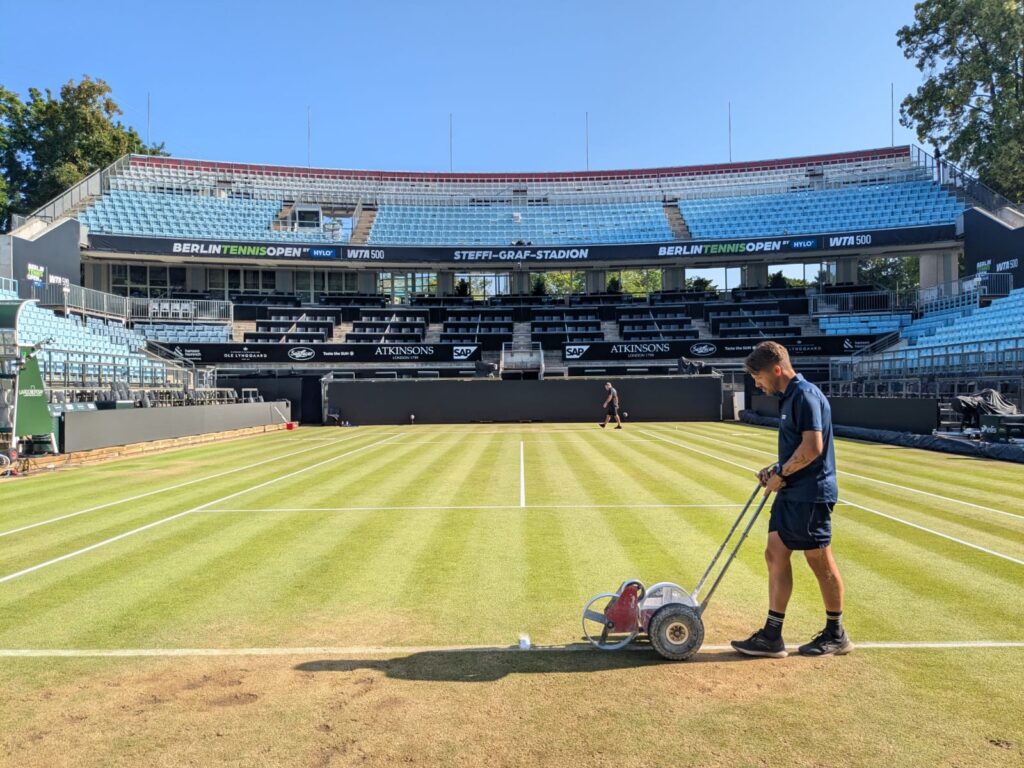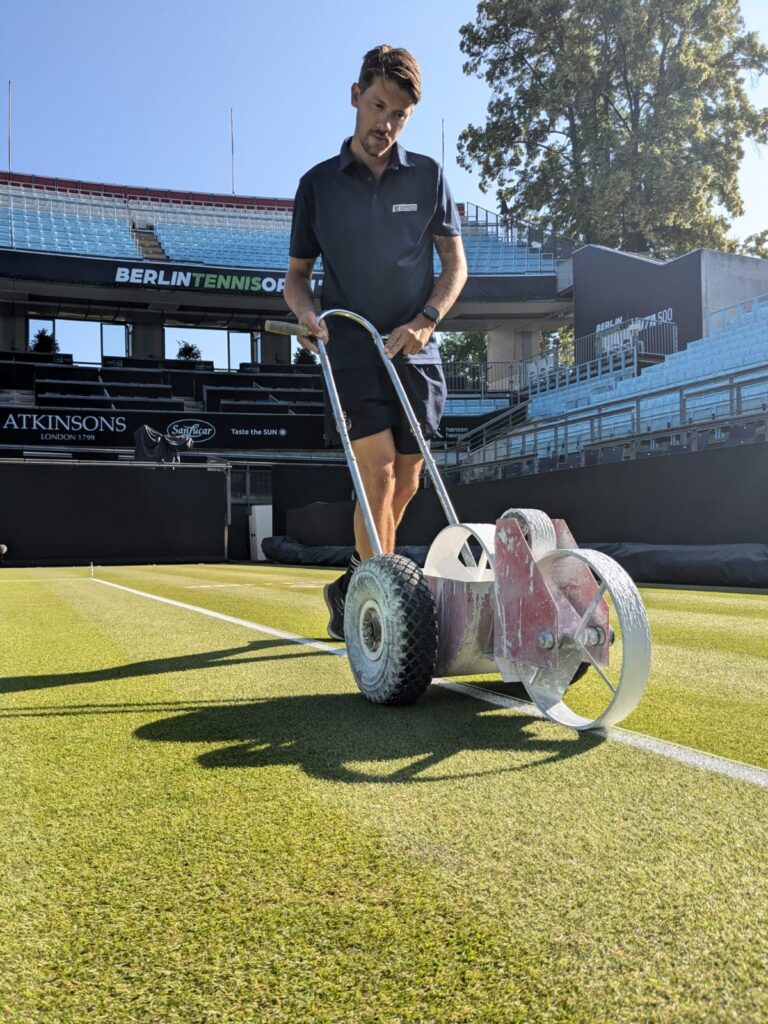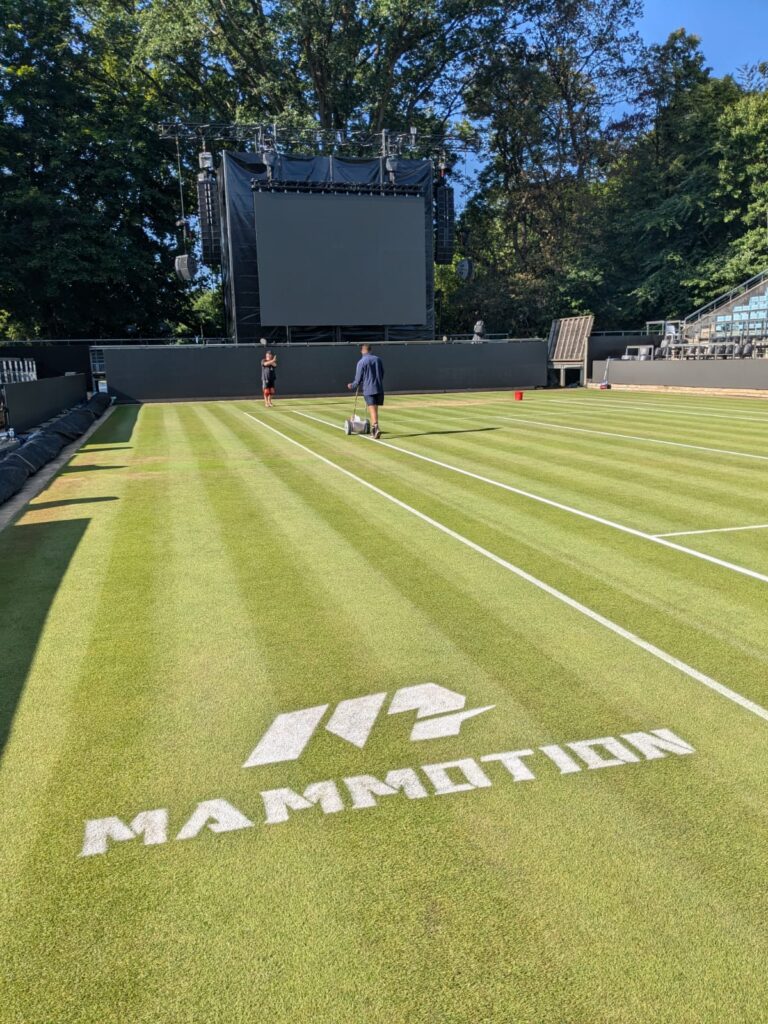If you’re looking to gain international experience in turf management or grounds maintenance, Germany is an excellent choice to consider. With a wide range of professional football clubs, golf courses, stadiums, and public sports facilities, the country offers regular opportunities for greenkeepers who want to travel and build their careers.
Here, we’re explaining everything you need to know about how to work in Germany under the Working Holiday Visa scheme, especially if you have experience in turf care or groundskeeping.

What Is the German Working Holiday Visa?
The Working Holiday Visa in Germany allows young people from certain countries to live and work in Germany for up to 12 months. The goal of this visa is to promote cultural exchange by helping travellers cover the cost of their stay through short-term or casual employment.
While most people participating in the Working Holiday Visa take up jobs in hospitality or childcare, you can also work in a skilled role, like turf management, provided you can line up a position in advance or on arrival.
Unlike some countries, Germany doesn’t offer one general visa. Instead, it has bilateral agreements with individual countries. The exact name and conditions of the visa vary depending on your nationality.
Who Can Apply
To get a Working Holiday Visa for Germany, you need to be between 18 and 30 years old (up to 35 for Canadians and New Zealanders) and hold a passport from one of the following countries:
- Australia
- Canada
- New Zealand
- Japan
- South Korea
- Hong Kong
- Taiwan
- Israel
- Chile
- Argentina
- Uruguay
- Brazil
- Peru
You might be surprised (and disappointed) to see that the UK isn’t on this list. Unfortunately, UK citizens aren’t currently eligible for a Working Holiday Visa in Germany due to the end of the EU free movement agreement post-Brexit. If you’re lucky enough to be an EU citizen or hold dual citizenship with an EU country, you’ll still be able to live and work in Germany without a visa. There’s also the D Visa, which we’ve discussed later in this guide.
You’ll need to show proof of funds to support yourself when you arrive—usually around €2,000 to €3,000, depending on the specific visa rules for your country—and have travel insurance for the entire length of your stay. You’ll also need a return ticket or funds to buy one.

How to Apply
You usually need to apply for the visa in person at the German embassy or consulate in your home country before travelling. You’ll need to provide:
- A valid passport
- A completed application form
- Proof of health insurance
- Proof of funds
- A passport photo
- Your CV or a short letter explaining your plans in Germany
- A return or onward travel ticket, or proof that you can afford one
Some embassies allow you to apply from within Germany if you’re from Canada, New Zealand, or Australia, but it’s safest to check your country-specific rules before you even start looking at flights. The time it takes to process your application depends on the country you’re applying from, but the typical timeline is within two to four weeks. The visa fee ranges from €75 to €100.
Finding Work in Turf Management
You’ll need to be proactive if you want to find work in turf care while you’re in Germany. Jobs in sports turf are rarely advertised publicly, especially in English, but don’t let that put you off—lots of clubs and contractors are still open to hiring international workers if you contact them directly.
If you already have greenkeeping experience, it’ll make the most sense to start by contacting golf courses and football clubs in larger cities or regions with busy sports calendars. Bavaria (home to Bayern Munich), North Rhine-Westphalia (Borussia Dortmund, Bayer Leverkusen), and Berlin are good places to start. Many of the football stadiums in Germany use hybrid or high-performance natural turf, so having hands-on experience with this turf will put you in a good position.
Germany also has hundreds of golf courses (public municipal courses and high-end private clubs). Peak hiring periods usually begin in early spring (March–April), when clubs are preparing for the season ahead.
You can also explore temporary work with landscaping and grounds maintenance companies that manage public parks and municipal sports fields. Just keep in mind that many companies will expect you to know at least basic German, although some may be open to hiring English-speaking workers, especially if you bring specialised skills.
At International Greenkeepers for Hire, we can help you make connections before you land. Our Turf Passport system connects experienced turf professionals with seasonal roles across Europe, including Germany. You can also browse our Facebook group or reach out for advice on putting your CV in front of the right contacts.
The D Visa For UK Citizens
If you want to work in Germany and you’re a UK citizen, you can apply for a German D Visa to work in the country, but only if the job qualifies as skilled employment. That means you need to have a recognised vocational qualification (typically two years or more) in a relevant field like turf management, landscaping, or horticulture. Basic groundskeeping or general labour roles don’t meet the requirements for this visa.
If you do hold a recognised qualification and have a job offer in a matching role, you may be eligible, as long as the German Federal Employment Agency approves the position. You can enter Germany visa-free and apply for the residence permit within 90 days, but you can’t start working until the permit is granted.
Given the restrictions that apply to the D Visa, many UK citizens in our industry still won’t be eligible to live and work in Germany in a turf management role.
Setting Up Once You Arrive
Once your visa is approved and you arrive in Germany, there are a few key steps to get started.
- Register your address at your local Bürgeramt (town hall) within 14 days of finding accommodation. This process is called Anmeldung and is legally required.
- Open a German bank account so you can receive your wages.
- Get a tax ID number (Steueridentifikationsnummer), which is issued automatically after registering your address. It’ll be sent to your postal address.
- Set up public or private health insurance, depending on your employer and visa terms. If you’re working a short-term or casual job, travel insurance might be accepted, but if you take on longer roles, you may need German coverage.
Renting accommodation can be expensive if you’re looking to work in a large city like Munich or Hamburg. Many Working Holiday travellers start by staying in hostels or short-term Airbnbs before they look into flat shares (Wohngemeinschaften, or WGs). If you line up a job in advance, your employer might be able to help you with local housing recommendations.
Working Hours and Wages
Germany has strong labour protections, even for temporary workers. Most turf roles will fall under standard full-time hours (35–40 hours per week). As of 2025, the minimum wage in Germany is €12.41 per hour, although skilled turf workers can often earn more, especially in sports facilities or golf courses.
You’ll typically be paid monthly, and employers are required to provide payslips and pay your social security contributions. If you’re self-employed (for example, contracting to clubs directly), you’ll need to register with the tax office (Finanzamt) and invoice properly.


Can You Extend Your Stay?
The Working Holiday Visa is a one-time, 12-month visa with no extension for most nationalities. There is one exception: if you’re from Canada or New Zealand, you might be able to extend your stay in Germany or apply for a different visa category while you’re still there, such as a Job Seeker Visa or a longer-term Work Visa if you’ve found a permanent position.
Some turf workers use the German visa as a stepping stone to seasonal jobs across Europe. You can travel freely through the Schengen Zone (including France, Netherlands, Spain, etc.) for up to 90 days within any 180-day period without a visa, which makes Germany a good base for travelling workers between seasons.
Making the Most of the Experience
Germany is a great place to live and work. It’s easy to travel between cities on the train system, and you’ll have plenty of free time if you’re in a seasonal turf role. Spending weekends hiking in the Alps, exploring Berlin’s cultural scene, and heading to Oktoberfest are just a few things to do while you’re in the country.
From a professional perspective, you’ll also pick up new skills working with turf in a different climate and cultural setting. If you’re used to working in drier or hotter environments, Germany’s seasonal changes (especially autumn and winter) will give you experience with a wider range of turf care challenges.
Getting Started
If you’re serious about working in Germany in a turf or greenkeeping role, here are your next steps:
- Check the requirements for your country’s Working Holiday agreement with Germany
- Apply early through your local German embassy or consulate
- Join our International Greenkeepers for Hire Facebook group to find turf job leads
- Register for Turf Passport to share your availability with hiring clubs
- Get your CV and references in order before you travel
With the right preparation, you can turn your time in Germany into a travel experience and a career-building opportunity.
